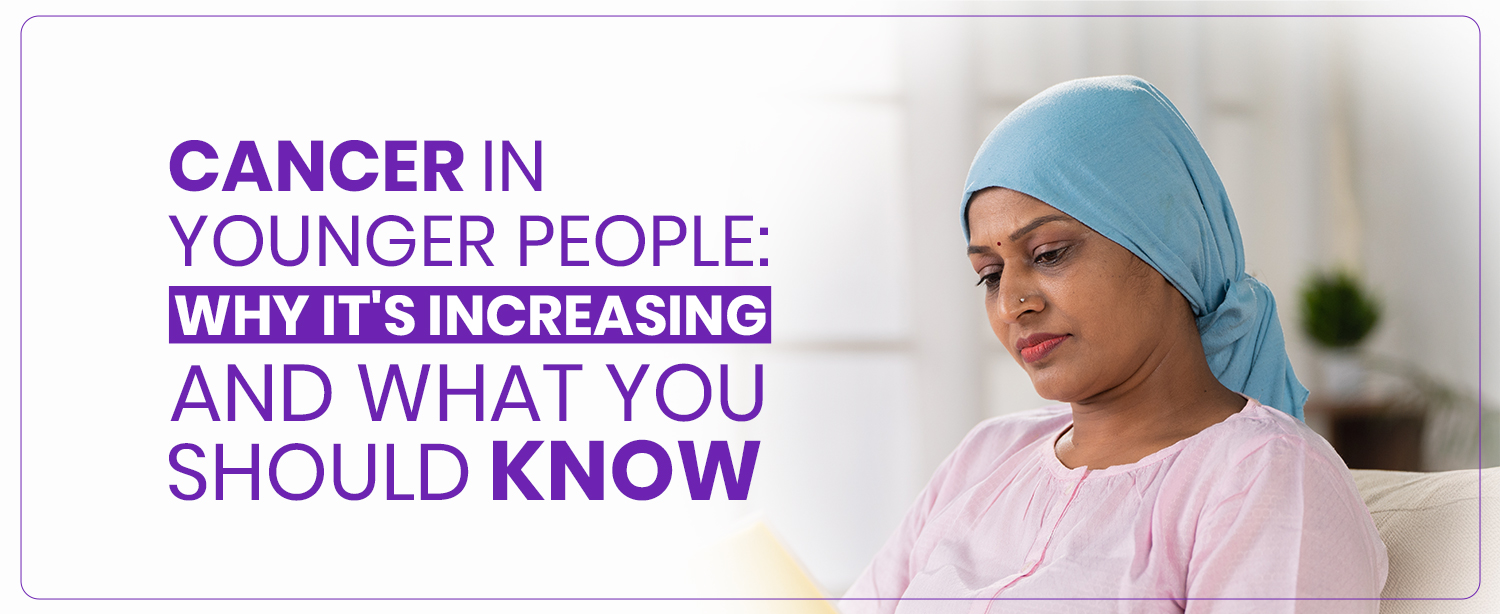Cancer is often thought of as a disease that affects older individuals, but in recent years, there has been a concerning rise in cancer diagnoses among young people. This trend is alarming, as it signals that factors affecting younger generations might be contributing to this increase.At Kokilaben Dhirubhai Ambani Hospital, Mumbai, we believe in empowering individuals with the knowledge they need to make informed decisions about their health. Understanding the reasons behind this rise, as well as the steps that can be taken to reduce risk, is crucial for protecting the well-being of younger populations.
Table of Contents
Understanding the Rise in Cancer Among Young People
While cancer is still more common in older adults, recent research indicates that certain types of cancer are increasingly being diagnosed in individuals under the age of 40. Experts suggest several factors that may contribute to this rise:
- Lifestyle Choices
Unhealthy lifestyle choices such as poor diet, lack of physical activity, and smoking have long been linked to various types of cancer. Unfortunately, many young people today face greater exposure to these risk factors, whether it’s consuming processed foods, sedentary behavior, or vaping and smoking. These habits not only affect general health but can also increase the likelihood of developing cancer at a younger age. - Environmental Exposures
From air pollution to chemical exposure, environmental factors have been shown to contribute to the development of cancer. Young people today are facing heightened exposure to pollutants in urban environments, as well as chemicals in everyday products, food, and water. - Genetic Predispositions
While lifestyle choices play a major role, genetics also contributes to the likelihood of developing cancer. Certain inherited gene mutations can significantly increase the risk of cancers like breast, ovarian, and colorectal cancer. Though this factor is less controllable, understanding family medical histories can help detect risks early and guide preventive measures. - Delayed Diagnosis
Cancer in young people may often go undetected or misdiagnosed. Since cancer is typically viewed as a disease of older adults, symptoms in younger individuals may be overlooked or attributed to less serious conditions. Early detection is crucial to improving survival rates, but a delayed diagnosis can result in more advanced stages of cancer by the time it is discovered.
Practical Steps to Reduce Cancer Risk
Though some risk factors are out of our control, there are practical steps everyone can take to reduce their chances of developing cancer. These include:
- Adopt a Healthy Diet
Eating a balanced diet rich in fruits, vegetables, whole grains, and lean proteins can help maintain a healthy weight and reduce cancer risk. Avoid processed foods, excessive sugar, and alcohol, as these are linked to certain types of cancer. - Exercise Regularly
Physical activity is a key factor in cancer prevention. Regular exercise of at least 30 minutes most days of the week helps maintain a healthy weight, improves immune function, and reduces inflammation—all of which can lower the risk of cancer. - Avoid Tobacco and Limit Alcohol
Tobacco use is the leading cause of cancer and cancer-related deaths, especially lung cancer. Quitting smoking or vaping and limiting alcohol consumption can significantly lower the risk of various cancers. - Practice Sun Safety
Excessive sun exposure can increase the risk of skin cancer, particularly melanoma. Use sunscreen with an SPF of 30 or higher, wear protective clothing, and avoid prolonged sun exposure, especially between 10 a.m. and 4 p.m. - Know Your Family History
For those with a family history of cancer, it’s important to speak with a healthcare provider about genetic testing and early screening options. Early detection through regular check-ups and screenings can help identify potential issues before they become more serious. - Stay Informed and Get Regular Check-ups
Regular medical check-ups are essential, especially if you notice any unexplained symptoms such as persistent pain, unusual lumps, or changes in your skin or bowel habits. Early detection can lead to better outcomes, so staying vigilant and informed is key.
Essential Cancer Screenings
Screening plays a crucial role in early detection and care, that can improve treatment outcomes. Here are some cancer screenings recommended for young adults:
- Breast Cancer Screening
Women should perform monthly breast self-exams and discuss mammography with their doctor starting at age 40 or earlier based on risk factors. - Cervical Cancer Screening
Starting at age 21, women should undergo a Pap test every three years, and young girls must take the HPV vaccine. - Colon Cancer Screening
Recently, recommendations have shifted to start screening for colorectal cancer at age 45, especially important as its incidence in younger adults rises.
Cancer Treatment at Kokilaben Dhirubhai Ambani Hospital, Mumbai
At Kokilaben Dhirubhai Ambani Hospital, Mumbai we are dedicated to raising awareness about the growing prevalence of cancer in young people. While genetics and environmental factors play a role, adopting a healthy lifestyle and staying informed about potential risks can help protect younger generations from this life-threatening disease. By making small but impactful changes to daily habits and seeking regular medical advice, individuals can reduce their cancer risk.
If you are experiencing any symptoms of cancer or are at a high risk of getting cancer you must consult with specialists at the best cancer hospitals in India like oursfor personalized advice and state-of-the-art care. The best oncologists in Mumbai at our Centre for Cancer help you make informed decisions regarding prevention, diagnosis and treatment of cancer cases. Our oncologists and onco-surgeons offer multi-disciplinary care that includes radiation therapy, chemotherapy, surgical procedures, and rehabilitation care. We are equipped with advanced technologies such as:
- Minimal Access and Robotic Surgery for a broad range of cancers
- High-Intensity Focused Ultrasound (HIFU)
- Cutting-edge radiotherapy options including Trilogy, Edge™, and Novalis Tx for Radiosurgery
- The latest Digital PET Scan for accurate diagnosis
Stay informed and proactive about your health to prevent and manage cancer effectively. For more information, please visit our website at the link provided below. https://www.kokilabenhospital.com/departments/centresofexcellence/centrefor_cancer.html


